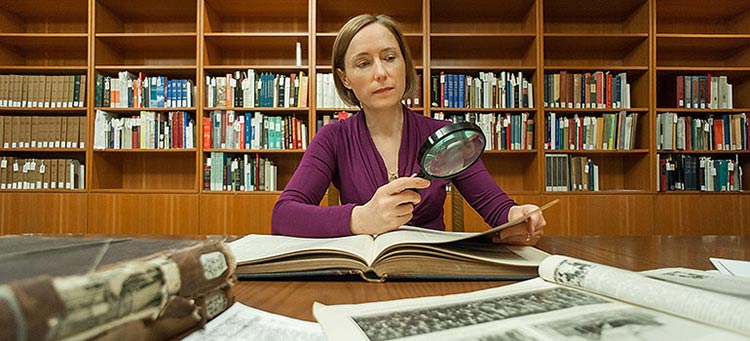

By Michelle Keong
Associate Professor Mary Chapman won the 2006 Yasuo Sakakibara Prize from the American Studies Association for an essay on writer Sui Sin Far, believed to be the first Eurasian to publish in Canada and the United States.
The paper is part of a book-in-progress on American suffrage literature, and examines Far’s work during the Progressive Era, a period of reform from the 1890s through the 1920s that saw many Americans push for social justice, general equality, and public safety.
Separated from her two-year-old son for nearly a year, a Chinese mother sacrifices everything to get him back. After spending her life’s savings to hire a lawyer, the woman is reunited with her child. But he no longer remembers her, or their native tongue.
She can’t believe that the government would take away her child in what she thought would be “the land of the free.”
The story — entitled “In the Land of the Free” — was published in 1912 in Mrs. Spring Fragrance, a popular short story collection by Sui Sin Far, pen name of British-born writer Edith Maude Eaton (1865 – 1914).
The story collection reflects the struggles and joys in the daily lives of Chinese families in North America. Far, who lived in Montreal and later moved to San Francisco and Seattle, depicts the anguish of Chinese immigrants, and the suffering inflicted by discriminatory immigration laws.
Associate Professor Mary Chapman, who teaches in the Department of English Langauge and Literatures, recently won the 2006 Yasuo Sakakibara Prize from the American Studies Association for an essay she wrote on the pioneering writer.
Chartered in 1951, the American Studies Association has more than 5,000 members, including teachers and other professionals, concerned with American culture.
Prof. Chapman’s paper is part of a book-in-progress on American suffrage literature, and examines Far’s work during the Progressive Era, a period of reform from the 1890s through the 1920s that saw many Americans push for social justice, general equality, and public safety.
Among other things, the progressive movement called for the humane treatment of mentally ill people, worked for the organization of unions, and gave citizen women in the United States the right to vote by 1920.
Prof. Chapman probes into Far’s awareness of the shortcomings of the Progressive Era and the exclusion of Chinese immigrants from fundamental rights.
“At the very same time that they were advocating greater access to government, and votes for women, they excluded the Chinese from immigrating,” Prof. Chapman says.
Born to a Chinese mother and a British father, Far began her career at The Montreal Star and wrote one of the first public statements in opposition to the Chinese Head Tax in Canada. She wrote numerous articles and stories, which appeared mainly in American newspapers and magazines.
Prof. Chapman has found new material through what she calls intense digging in Far’s life. After searching for works not included in “Mrs. Spring Fragrance,” she has found articles showcasing the writer’s interest in China’s efforts to change outdated laws.
The enfranchisement of women in a Chinese province in 1912, while progressives in the U.S. were still campaigning for women’s right to vote, exposed the limits of American efforts to reform, says Prof. Chapman.
“So all of a sudden, this culture, which even the most progressive-minded Americans had perceived as inferior and backward, had given their votes to women,” she says.
“Far was very supportive of the Chinese reform movement which had, as one of its goals, the enfranchisement of Chinese women,” she adds. “She took great delight in showing how liberated Chinese women were.”
Prof. Chapman believes it was clear to Far that the progressive movement had an exclusive agenda. The writer’s “In the Land of the Free” pinpoints just that.
The story simultaneously captures the humanity of Chinese people while demonstrating the human costs of racist laws. A young boy’s inability to recognize his mother and the loss of his native language at the story’s end signals the costs of cultural assimilation.
“There were so many racist policies that coincided with the progressive movement. So I think Sui Sin Far was a very canny judge of that,” Prof. Chapman says.
As the first Eurasian to publish in Canada and the United States, Far’s writing in prominent magazines such as Good Housekeeping and New England Magazine gave Americans of Chinese ancestry and women a literary voice, notes Prof. Chapman.
“What I’m finding really interesting about her is that she is broadly concerned with questions of mixed race, hybrid cultures, and other races in the broader continental context,” she says.
“Her focus, and her topics go way beyond her interest in the Asian American community, which is what she is well known for.”
The story of a white stenographer in Seattle who, on her wedding day, discovers that her husband has fathered an Alaskan child sheds light on Far’s curiosity, suggests Prof. Chapman.
“Her interest in hybridity goes far beyond the Asian American experience,” she adds.
Prof. Chapman’s current project on American suffrage literature and interest in how women find voices in historical contexts that do not allow them to speak has brought to light the writer’s unique position.
“I was finding that so many of my chapters were focused on white women from the northeast,” she adds, “so I was so happy to find Sui Sin Far’s stories, which offered a very different perspective.”
Prof. Chapman hopes to publish a second collection of Far’s writings to move the writer away from a position that is strictly pro-Chinese, or anti-Progressive.
“There are big gaps in her publication history and I think that most people have just focused on this book that appeared, but the fact is she was an active journalist for at least 15 years,” Prof. Chapman says.


